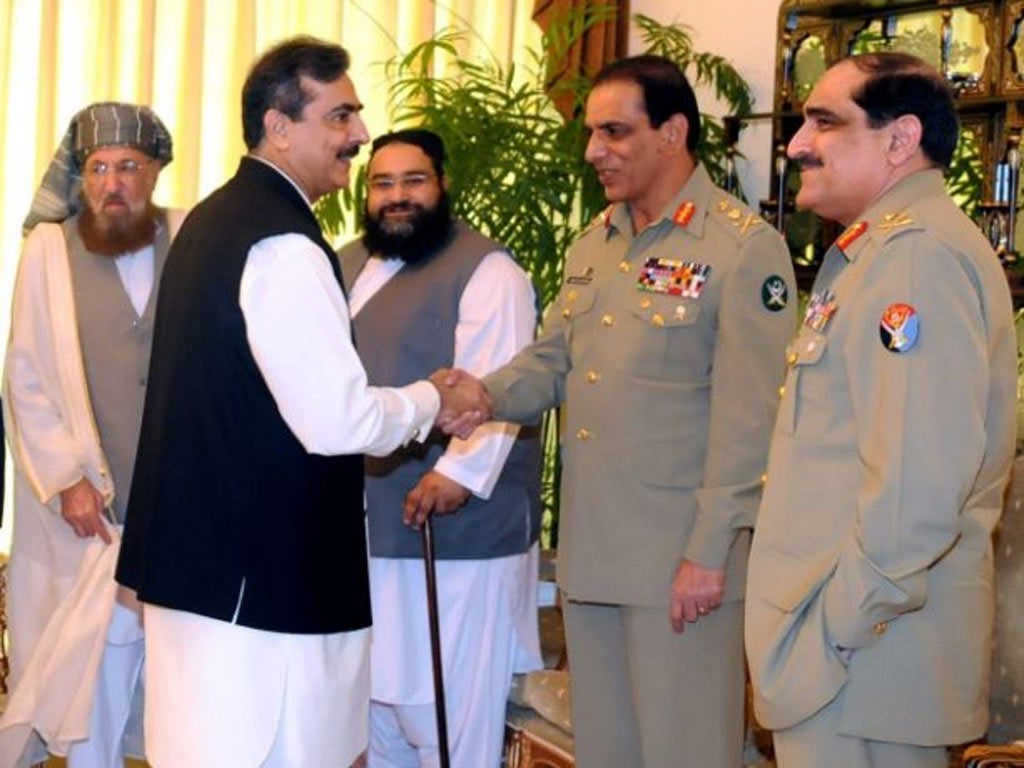The admiral, the terror network and a crisis in US-Pakistan relations

Pakistan's political and military leadership were last night trying to hammer out a response to the most fierce public criticism Islamabad has faced from Washington since the nations forged an alliance in the white heat of the 9/11 attacks.
America has claimed that the Haqqani insurgent network operates as a "veritable arm" of Pakistan's Inter-Services Intelligence (ISI) agency. But Prime Minister Yousuf Raza Gilani told politicians and generals, including the army chief General Ashfaq Parvez Kayani: "We reject these allegations. God willing," he added, "we can face these challenges with unity. We are committed to defend our independence and sovereignty."
Admiral Mike Mullen, chairman of the US Joint Chiefs of Staff, sparked the dispute last week when he made the claims about the ISI's connections to the Haqqani network in testimony to the Senate. Elaborating in an interview with npr, formerly National Public Radio, he said: "The ISI specifically has enough support for the Haqqanis in terms of financial support, logistic support – and actually, sort of free passage in the safe havens ," he said. "Those links are part of what enable the Haqqanis to carry out their mission."
The White House has played down Mullen's words, which were delivered after an attack by militants on the US embassy in Kabul blamed on the Haqqanis, a father and son insurgent group that has for many years operated in Afghanistan while taking refuge in Pakistan's tribal areas. Anonymous officials said that he had "overstated" the ISI's relationship with it, while White House press secretary Jay Carney said it was "not language I would use".
Western officials disagree about the degree of influence the ISI has over the Haqqanis, but do not dispute a link. In Pakistan, diplomats describe the relationship as murkier than Admiral Mullen suggested. But there are fears of a possible, even imminent, use of military force to target them in North Waziristan. Anxious about such action, Pakistan's media has hardened its already hostile attitude to Washington.
Meanwhile, just four months after the powerful Pakistan army endured unprecedented criticism for its failure to locate Osama bin Laden, prevent the US raid that killed him and defend a major naval base against militant attacks, it has been rehabilitated with surprising ease. "The nation is proud of its armed forces," Mr Gilani said, "they have never disappointed us in matters of defence."
In the current dispute, some of the anger usually reserved for Pakistan's neighbour, India, has been directed at Washington. Some television channels have taken to playing war anthems. "O, enemies you have defied this nation," said one, using words from General Ayub Khan's speech at the start of the 1965 war against India. "O, infidels you have defied this nation," it added, showing images of Admiral Mullen and defence secretary Leon Panetta.
The Pakistan army doesn't deny its links with the Haqqanis. "What General Kayani tells the Americans when they ask about the Haqqanis," said a senior military official, "is that no agency in the world will cut off their last contact with them." The arrangement, the military official added, is in place to yield "positive" dividends.
What worries the army are the opaque threats of military action. US defence secretary Leon Panetta warned that the US would "take whatever steps are necessary to protect our forces." That, the Pakistani army said, has put General Kayani on the spot. "We have to do something," the military official said.
"We are being pushed against the wall. If we don't react, the public opinion will consume us."
Most observers believe the US's relationship with Pakistan is too important to be allowed to fail. But US officials, now airing allegations in public that were previously made only in private, may have to accept that Pakistan's foreign policy priorities are not necessarily those of Washington.
"Pakistan has long used non-state actors, from Lashkar-e-Taiba to the Taliban. They are not going to [stop that] and we have to live with it," said a former Indian intelligence official, who asked not to be named.
In Washington, much talk has focused on the billions of dollars in aid, mostly used to purchase of military equipment, given to Pakistan in the last decade. George Perkovich, an expert on Pakistan at the Carnegie Endowment for International Peace, said the stand-off was an opportunity for the US to do more to bolster Pakistan's civilian administration.
Professor S Akbar Zaidi, a Karachi-based social scientist, said of the row: "It's posturing, nothing more than that. Both countries rely on each other. Neither can afford to declare a non-communicative relationship."
But trying to get ahead in this current battle of words and perceptions, Islamabad has been very publicly signaling that it is prepared to lean away from Washington.
Over the past week, there have been a series of high-level exchanges with Beijing and Riyadh. The Saudi army participated in military exercises in Pakistan, and the Chinese deputy prime minister has also visited the country.
"Let's not talk USA here," Rehman Malik, Pakistan's interior minister, reproached reporters when he met Meng Jianzhou, the Chinese deputy premier. "I am here with my friend China."
Subscribe to Independent Premium to bookmark this article
Want to bookmark your favourite articles and stories to read or reference later? Start your Independent Premium subscription today.

Join our commenting forum
Join thought-provoking conversations, follow other Independent readers and see their replies